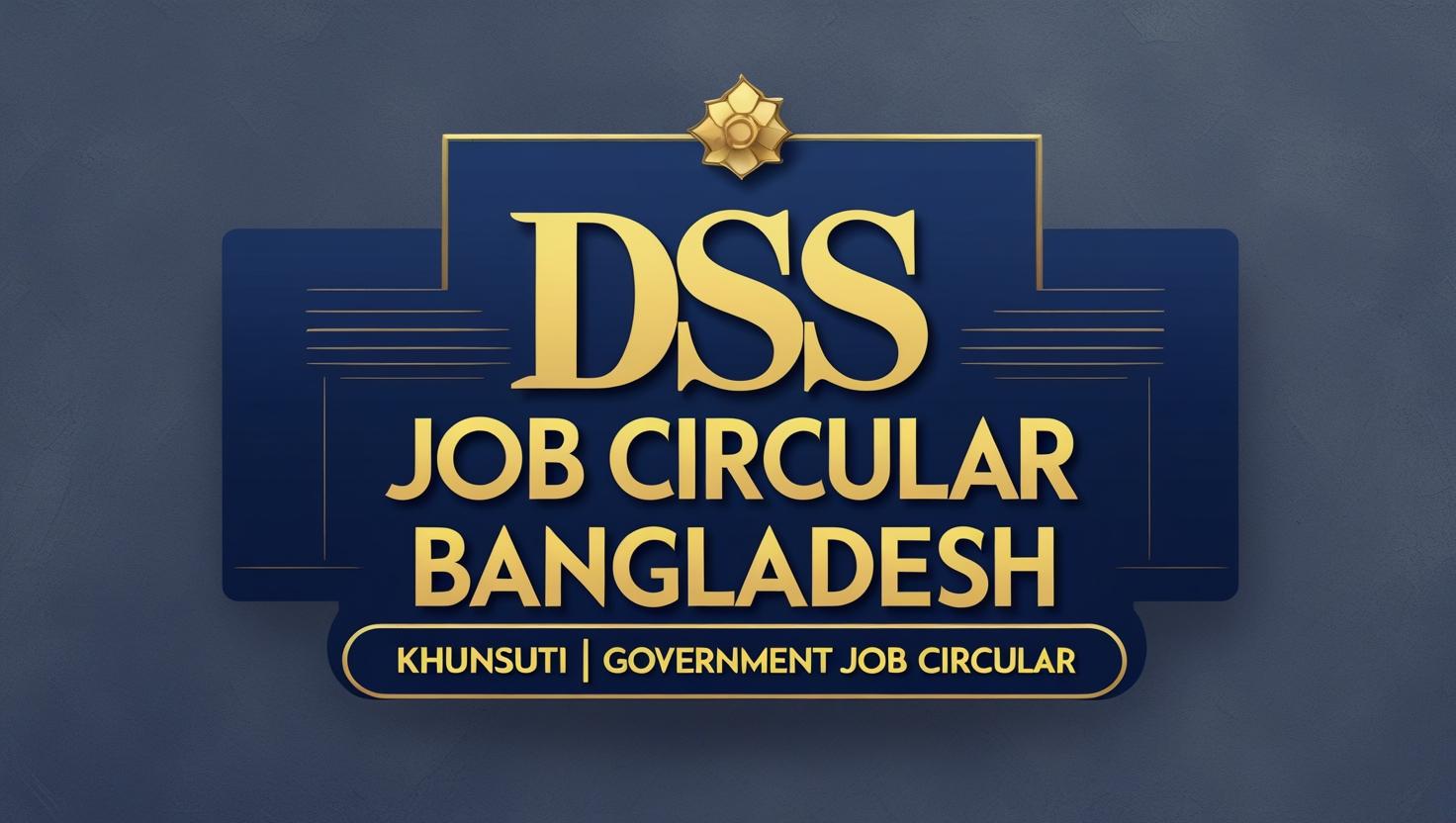The DSS job circular is a crucial element in the landscape of employment opportunities in Bangladesh. By providing detailed information about job openings, the circular serves as a guiding light for those seeking stable careers while contributing to the nation’s development.
Understanding the significance of the DSS job circular can significantly enhance your career prospects in Bangladesh. It acts as a centralized source of reliable information for job seekers, which is invaluable in today’s competitive market. When you tap into these resources, you can align your skills and educational background with available job positions effectively.
The Role of DSS in Job Creation
The Department of Social Services (DSS) plays a vital role in promoting social welfare and providing various services. They not only create job openings within their own departments but also shape the job market by influencing policies and programs aimed at improving employment rates across Bangladesh. This governmental body regularly releases their job circulars, making it easier for candidates to stay informed.
Key Benefits of the DSS Job Circular
- Centralized Information: The DSS job circular compiles opportunities in one place, thus saving you time and effort in your job hunt.
- Transparency: Each circular includes essential details such as qualifications, application deadlines, and required documents, which promotes fairness in the hiring process.
- Variety of Positions: The DSS circular covers a diverse range of job roles, from entry-level positions to managerial roles, catering to candidates with various educational backgrounds.
- Focus on Social Impact: Working with DSS means contributing to society, making the job not only a means of livelihood but also a source of personal fulfillment.
How to Utilize the DSS Job Circular Effectively
To gain the most benefits from the DSS job circular, consider these practical steps:
- Regularly Check the Updates: Make it a habit to visit the official DSS website or trusted career portals to stay updated on new job announcements.
- Tailor Your Resume: Customize your resume to suit the specific role for which you are applying. Highlight relevant experiences and skills.
- Prepare for Interviews: Once you secure an interview, prepare wisely. Research the DSS and the specific department to which you are applying.
- Engage with Others: Join forums or social media groups related to DSS recruitment to exchange information and experiences with other job seekers.
Where to Find DSS Job Circulars
The DSS job circular can be found on various platforms. Here are some trusted resources:
| Resource | Link |
|---|---|
| Department of Social Services Official Website | Visit Now |
| Bangladesh Government Job Portal | Visit Now |
| Job Circulars and Updates | Visit Now |
Utilizing these resources can assist you in finding job openings not just in DSS but also in other government sectors. Networking with individuals already working in DSS or similar roles can provide insights that you might not find in official announcements.
The Future of Employment through DSS
As Bangladesh develops, the demands of the job market evolve as well. The DSS job circular is not just an immediate resource; it also shapes your long-term career path. By regularly engaging with these listings, you enhance your employability and adaptability in a shifting economic landscape.
In essence, the DSS job circular is more than just a list of job openings. It’s an opportunity for personal growth and empowerment within the Bangladesh workforce. Keeping an eye on this circular is essential for anyone looking to build a meaningful career in this vibrant and ever-changing economy.
Key Requirements for Applying to DSS Job Circulars in Bangladesh

Applying for government jobs in Bangladesh, particularly through the DSS job circular, requires a clear understanding of essential requirements. Knowing these key aspects can significantly enhance your chances of securing a position. Here’s a breakdown of the main requirements you should consider when applying for these roles.
Educational Qualifications
Your educational background plays a crucial role in meeting the job requirements. Different positions within the DSS may require varying levels of education:
- Entry-Level Positions: Generally require at least a Secondary School Certificate (SSC) or equivalent.
- Mid-Level Positions: Often need a Higher Secondary Certificate (HSC) or higher.
- Senior Roles: Usually necessitate a bachelor’s degree or advanced qualifications in relevant fields.
Age Limitations
Age requirements are strictly enforced in DSS job circulars. Typically, candidates must be within a certain age range. However, there may be some relaxation for specific groups such as:
- Freedom Fighters’ children
- Persons with disabilities
It’s essential to check each circular for the precise age limit related to the specific post you are interested in.
Experience
Experience is an important criterion, particularly for mid and senior-level positions. Here’s what you should keep in mind:
- Entry-Level Positions: Usually do not require prior experience but relevant internships may be beneficial.
- Mid to Senior-Level Positions: Typically require 1-5 years of experience in relevant fields.
Make sure you highlight your experiences in your application to stand out.
Technical Skills
Proficiency in specific technical skills can enhance your application. Depending on the position, requirements may include:
- Computer literacy, including skills in Microsoft Office.
- Knowledge of data management and reporting software.
- Expertise in communication tools and platforms.
Demonstrating these skills in your resume or during an interview can significantly boost your chances of being selected.
Documents Required
When applying, ensure you have the following documents ready:
- Application Form (filled in as per the circular instructions)
- Curriculum Vitae (CV)
- Photocopies of educational certificates
- National ID card or birth certificate
- Passport-sized photographs
How to Apply
The process of application can vary depending on the job circular. Generally, it might include:
- Collect the application form from the official DSS website or designated offices.
- Fill in the application form with accurate information.
- Submit your application along with the required documents before the deadline.
Finding the Right Circular
Keep your eyes open for new job circulars regularly. You can find these announcements on:
Pre-Appointment Considerations
Once you receive a call for an interview, prepare yourself by:
- Researching the role and organization.
- Practicing interview questions.
- Dressing appropriately for interviews.
Remember that first impressions count!
The options available through the DSS job circular are promising for many job seekers in Bangladesh. Being well-prepared and informed about the requirements can position you effectively for success in your application process. Always refer to official announcements to ensure you meet the criteria laid out in each job circular.
Strategies to Stand Out in the DSS Job Application Process

In today’s competitive job landscape, especially for roles within the Directorate of Secondary and Higher Education (DSS) in Bangladesh, standing out during the application process is essential. Every applicant vies for attention, and having effective strategies can significantly enhance your chances. Below are several methods that can help you shine in the DSS job application process.
Tailor Your CV and Cover Letter
Your CV and cover letter should reflect the skills and experiences that align with the requirements of the DSS position you’re applying for. Here are a few tips:
- Customize Your Documents: Research the DSS job circular carefully and incorporate relevant keywords into your CV and cover letter that match the job description.
- Highlight Relevant Experience: Focus on past experiences that demonstrate your skills applicable to the role at DSS. Be specific about your contributions in previous roles.
- Professional Format: Ensure that your CV and cover letter are professionally formatted and free from errors. A clear, organized structure enhances readability.
Understand the DSS Job Circular
Make it a point to study the DSS job circular thoroughly. Understand the core responsibilities, qualifications, and required skills. This knowledge will help you articulate why you are the best fit for the position you’re applying for. Here’s what to focus on:
- Key Responsibilities: Be aware of the duties you will be required to perform. Prepare examples of how your experience aligns with these tasks.
- Essential Qualifications: Ensure you meet all educational and professional qualifications specified in the circular.
- Desired Skills: Identify the desired skills and think of specific ways you’ve demonstrated them in your previous roles.
Prepare for Interview Questions
Once your application catches the attention of the DSS recruitment team, the next step is the interview. You can prepare by gathering information and practicing possible questions. Here are some effective strategies:
- Common Questions: Research common interview questions for positions within the DSS. Prepare concise and thoughtful answers.
- Situational Questions: Be ready to discuss scenarios where you have faced challenges. Use the STAR method (Situation, Task, Action, Result) to structure your answers.
- Company Culture: Familiarize yourself with the DSS’s culture and values, and be ready to discuss how you align with them.
Network with Current Employees
Networking can play a pivotal role in your job search. Engage with current or former DSS employees to gain insights into the organization and its hiring processes. Here’s how to effectively network:
- Use LinkedIn: Connect with professionals in the education sector. Engage with their content and ask for informational interviews to get an insider’s view.
- Attend Workshops and Seminars: Participate in educational events that are related to DSS. This allows you to meet people in the field and learn about job openings early.
- Join Relevant Groups: Become a member of groups or forums related to education in Bangladesh. Sharing knowledge can lead to valuable connections.
Showcase Your Commitment to Education
Highlight any voluntary work, projects, or initiatives focused on education. This shows your genuine interest and commitment to enhancing the education system in Bangladesh. Consider adding the following to your application:
- Volunteer Experience: List any volunteer roles that involve teaching or mentoring.
- Projects: Include special projects you’ve undertaken to improve educational outcomes.
- Continuing Education: Mention any courses, certifications, or workshops you’ve completed that relate to education.
Follow Up After Applying
After submitting your application, it’s beneficial to follow up when appropriate. A simple email expressing your enthusiasm for the position and inquiring about the timeline can leave a positive impression.
By incorporating these strategies into your application process for DSS jobs, you’ll improve your chances of standing out in a competitive field. For more information regarding the DSS job circular and updates, you can visit the official website of the Directorate of Secondary and Higher Education at dse.gov.bd.
Keep in mind that being well-prepared and strategic can make a world of difference in your job application journey.
Recent Trends in Government Job Opportunities in Bangladesh
In recent years, government job opportunities in Bangladesh have experienced significant changes. These trends not only reflect the rapid growth of the economy but also the evolving needs of society. As more people seek stable employment, government jobs are becoming increasingly attractive, and this is reflected in the way job circulars are structured and disseminated.
One notable trend is the digitization of government job applications. Several government agencies have begun to embrace online platforms for job postings, which significantly improves accessibility. The Directorate of Social Services (DSS) is a prime example, as it now publishes job circulars online, making it easier for applicants to find and apply for positions across various departments.
Moreover, there has been a marked increase in the types of positions available. Government sectors are diversifying their roles to meet the demands of modern governance, including the incorporation of IT, management, and social services. Here are some of the recent categories of jobs being offered:
- Administrative roles
- Technical positions in IT
- Social work and community service roles
- Environmental and sustainability experts
- Health services administration
Additionally, there has been a growing emphasis on merit-based recruitment. Most government agencies are now prioritizing the qualifications and skills of candidates rather than merely their educational background. This is evident through the introduction of competitive exams and interviews as a standard hiring practice, enhancing transparency and fairness in the recruitment process.
Government job circulars are also becoming more informative. They typically include clear eligibility criteria, detailed job responsibilities, and salary structures. For instance, a recent circular from the DSS provided comprehensive information on available positions, the application process, and the necessary qualifications. This shift helps potential candidates better understand their fit for various roles and increases the likelihood of qualified individuals applying for suitable positions.
| Job Position | Department | Eligibility Criteria | Salary Range |
|---|---|---|---|
| Administrative Officer | Directorate of Social Services | Master’s degree in any field | BDT 30,000 – 40,000 |
| Community Worker | Ministry of Social Welfare | Bachelor’s degree in social work | BDT 25,000 – 35,000 |
| IT Specialist | Ministry of Information | Degree in Computer Science or related field | BDT 40,000 – 50,000 |
Another emerging trend is the focus on inclusivity in government employment. Various initiatives aim to promote hiring from diverse backgrounds, especially for women and marginalized groups. The government recognizes the importance of representation in public service and is actively working towards creating an inclusive workforce.
Job seekers can benefit from various online platforms that provide updates on government job circulars. Websites such as BDJobs and Employment News offer comprehensive listings and alerts regarding upcoming government job openings. These platforms have become invaluable resources for job seekers looking to navigate the competitive landscape of governmental employment.
Furthermore, the ongoing COVID-19 pandemic has influenced remote work policies, resulting in some government roles being offered with flexible work arrangements. This adaptability not only suits the current global situation but also attracts a broader pool of candidates seeking work-life balance in their careers.
To summarize the latest trends in government job opportunities, it is evident that the landscape is evolving rapidly. With an emphasis on technology, merit-based recruitment, inclusivity, and a diverse array of job roles, potential candidates have more opportunities and resources at their disposal than ever before. Monitoring platforms regularly and staying updated on the changing job circulars can lead to fruitful career opportunities in the government sector.
The Role of Government Employment in Bangladesh’s Economic Development
In Bangladesh, government employment plays a critical role in shaping the country’s economic landscape. The public sector not only offers a steady income for thousands of families but also contributes significantly to national development. By providing stability and job security, government jobs help mitigate poverty and enhance social welfare. This dynamic is particularly important in a country where a large segment of the population relies on consistent, reliable employment sources.
The government sector in Bangladesh employs millions across various departments, ensuring essential services reach the populace. These services include education, healthcare, and infrastructure development, which are vital for economic growth. Additionally, government employees contribute to the economy through their spending, which stimulates local businesses and fosters economic expansion.
One significant aspect of government employment is its role in providing educational and professional opportunities for young people. Many government jobs come with training programs that enhance individuals’ skills, making them more competitive in the job market. Graduates from universities often seek government roles due to their perceived stability and benefits. This trend consequently influences career choices and helps shape the workforce in Bangladesh.
The integration of technology and efficiency improvements in the public sector has also contributed positively. Government agencies in Bangladesh have begun adopting digital tools to improve service delivery. These advancements simplify processes, making it easier for people to access services like government health care, education, and other civic amenities. As a result, the role of government employment continues to evolve, aligning with the digital age and impacting economic growth positively.
The Economic Impact of Government Employment
Government jobs create a ripple effect that strengthens the economy in various ways, including:
- Job Creation: With many departments expanding, more job openings arise. This leads to reduced unemployment rates and enhanced living standards.
- Increased Public Spending: Employees with government jobs spend their salaries in local markets, boosting economic activity. This spending contributes to an increase in demand for goods and services.
- Improved Infrastructure: Government employees work on projects that upgrade infrastructure, facilitating trade and investment, which are crucial for economic growth.
Government Employment and Poverty Alleviation
One of the primary goals of providing government jobs is to combat poverty. In Bangladesh, where a significant portion of the population lives below the poverty line, government employment serves as a lifeline. Here’s how:
- Stable Income: Consistent government jobs provide a predictable income, which helps families manage their financial needs better.
- Access to Benefits: Government jobs often come with additional benefits, such as health insurance, retirement plans, and paid leave, contributing to overall well-being.
- Social Mobility: Government employment opens doors for professional advancement, enabling individuals from lower-income backgrounds to improve their socioeconomic status.
Future of Government Employment in Bangladesh
The future of government employment appears promising as Bangladesh continues to develop. With increasing urbanization and a growing population, the demand for efficient public services will rise. The government is likely to prioritize recruitment to fulfill these needs. Moreover, efforts to enhance the recruitment process, like increasing transparency and reducing corruption, are essential for attracting talent to the public sector.
To stay relevant, public services must adapt to changing environments. This includes investing in training for employees to equip them with modern skills. The government must also improve workplace conditions to retain talent and ensure employee satisfaction. Innovations in policy and practice can boost public trust in government employment as a career path.
As Bangladesh strives toward becoming a middle-income country, the significance of government employment in economic development cannot be understated. For more detailed insights into government jobs in Bangladesh, visit Bangladesh Government Official Website or explore available job notifications at Department of Social Services.
Government employment forms the backbone of Bangladesh’s economic framework, increasing job availability, enhancing social welfare, and providing stability for many citizens. By fostering growth and protecting livelihoods, it ultimately drives the country’s economic development.
Conclusion
Exploring the significance of the DSS job circular in Bangladesh reveals a pathway to enriching career opportunities and personal growth. For those aspiring to secure a position within one of Bangladesh’s key government sectors, understanding the essential requirements for applying is vitally important. Potential applicants must hone their skills and ensure they meet the qualifications expected by the Department of Social Services.
To enhance your prospects, it is crucial to adopt effective strategies during the application process. This includes tailoring your resume, preparing for interviews by practicing commonly asked questions, and demonstrating a genuine passion for public service. Given the increasing trend of government job opportunities within the country, aided by initiatives that promote employment, individuals have more avenues than ever to pursue stable careers.
Furthermore, government employment plays a pivotal role in the nation’s economic development. By providing citizens with stable jobs, the government can foster community well-being and contribute to overall prosperity. Therefore, staying informed about the DSS job circular not only positions you for a promising career but also places you at the forefront of contributing to Bangladesh’s development.
Your journey towards securing a government position starts with knowing the DSS job circular. By leveraging the information about requirements, strategies, and understanding the broader impact of government jobs, you can effectively navigate the application process and set yourself on a path to success. Embrace this opportunity to make a meaningful impact on both your life and the lives of others in Bangladesh.



